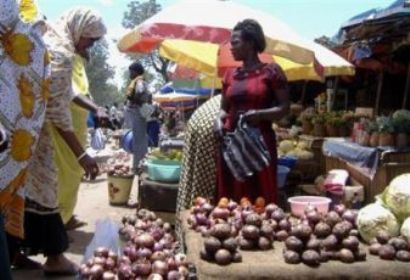S. Sudan’s Yei traders petition government over foreigners’ control of trade
March 2, 2016 (YEI) – Traders in South Sudan’s Yei town, capital of the newly established Yei River state, said foreigners have dominated and controlled different kinds of trade and businesses in the area, 160kms south of the national capital, Juba.

Foreign traders from Uganda, Ethiopia, Kenya, Eritrea and Sudan have dominated trade in Yei. Also major businesses including retails in the South Sudanese capital, Juba, are also controlled and monopolized by foreign traders.
Yei traders say local business people have been sidelined in the town with foreigners also controlling not only big businesses but also small retail shops.
In the petition seen by Sudan Tribune on Wednesday and read out by the secretary general of Yei chamber of commerce, Maliamungu Bosco, local traders also demanded partnership with foreign traders as a matter of law.
“All factories and companies should partner with the nationals. All the factories should give privileges and access to the locals in the areas of distribution of manufactured goods and commodities than bringing distributors from their own countries of origin,” partly reads the document.
“Factories should create job opportunities to the nationals, particularly the locals than bringing junior staff from their own countries of origin. Any trader who poses wholesale or company should not be allowed to do retail business in Yei,” it further reads.
The local traders also demanded that all the importers should have ware houses for operating their businesses so that wholesalers can buy from them.
“Mobile traders are totally prohibited in Yei,” it said.
Fekadu Mekuria, one of the business investors in Yei from Ethiopia, said he understood the concerns raised by the local traders in Yei, but said many South Sudanese locals in Yei were not ready to work as employees with foreigners.
“For us as business people, we don’t have problems. It is only that when South Sudanese are ready to work, we are ready to employ them and work hand in hand with us. Now that they have come up with new decisions we are ready to adhere and implement,” Mekuria said.
Meanwhile Yei’s municipal mayor, Cosmas Bidali Wori-Kojo, expressed commitment to develop a local policy towards equal protection of both local and foreign business people.
He also called on South Sudanese to be polite while dealing with their clients in businesses, suggesting rude behaviours from the locals at times, and added that South Sudanese could learn business and cooperative hard work from the foreign traders.
“It is not that South Sudanese don’t know business, let them learn the experience from other business men on how customers are being handled and taken care of when it comes to business. If you don’t know I must tell you that a customer is a king and boss to your business, without him or her then there is no business,” he remarked.
He further narrated that the foreign traders have understood that there are challenges and the role of the government to intervene, but added that “there is free market economy policy in South Sudan where everybody has rights to operate business.”
“We have roles by putting regulations to address some of those areas where the free market cannot. For example areas of employment, it’s us to handle it as they have put it, so it’s our role together with them and owners of the business to ensure that as intervention, it needs a policy that is good for all of them.”
Before the signing of the peace agreement to end 21 years of war in 2005, Sudanese traders dominated trade in South Sudan. However, after formation of an autonomous government and subsequent independent in 2011, foreign traders and business people from Ethiopia, Eritrea, Uganda and Kenya had influx into South Sudan and have continued to dominate major businesses such as companies and hotels in the country.
With the decision by the South Sudanese government to be a member of the East African community, there is likelihood that foreign business men from the region will continue to further dominate trade and even employment in the young nation unless a policy to speedily upgrade skills and capacity of local traders and civil servants will be put in place.
(ST)
